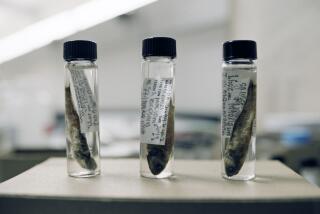U.N. Panel Nears Pact on Curbing Ocean Pollutants
- Share via
WASHINGTON — A U.N. conference neared completion Wednesday of an agreement intended to sharply curtail the number of chemicals polluting the world’s oceans.
With two days left in a two-week meeting, delegates said they were almost certain to set in motion a plan that would culminate in a 1997 conference to draw up restrictions on such chemicals as dioxin and DDT.
“It will be a significant step forward,” said Clifton Curtis, a Greenpeace official monitoring the United Nations Environment Program’s conference at the State Department.
The agreement, said Magnus Johanneson, secretary general of Iceland’s Environment Ministry, “will send a strong message to the private sector” concerning global intentions to limit the flow of poisons into the oceans.
Johanneson said the meeting--attended by representatives of more than 100 nations--was the first such international gathering to tackle the problem of chemicals known as persistent organic pollutants. These include chlorinated pesticides and such industrial products as PCBs. The pollutants are considered persistent because they cannot be easily broken down by natural processes.
With the oceans serving as the greatest natural source of food for humans, and the flow of pollutants from activities on land contributing to 80% of oceanic pollution, cleaning up such poisons is considered a crucial step toward preventing toxic and long-lasting chemicals from entering the human food chain.
The most hazardous chemicals are believed to cause neurological problems, reproductive disorders and cancers, and accumulate in body fat, growing more destructive over time. Even at low levels they interfere with the human endocrine system and impede immune systems, and have been linked to declining populations of dolphins, beluga whales and seals.
A June conference of scientific experts in Vancouver, British Columbia, found that bans, phaseouts and severe restrictions on the use of at least some of the chemicals were warranted.
But any attempt to limit the chemicals’ use is likely to come face to face with the problem of finding affordable and efficient replacements for chemicals that have also played an important role in protecting human health and increasing the food supply.
DDT, for example, while not used in the United States, is a highly valued pesticide in developing countries, where it is used to control mosquitoes and the strains of malaria they spread. Chlorine is used in the production of pulp and paper, in purifying water, in plastics and in solvents, among other things.
Referring to the value of DDT in fighting disease, Salif Diop, special adviser to the minister of the environment in Senegal, said: “It’s good to ban these products. But we have to find the right substitutes.”
Addressing the conference Wednesday morning, Vice President Al Gore said the problem posed by the chemical compounds was “one that all nations share in, not just because of the dangerous consequences in areas close to their use and production, but also because we have seen these compounds migrate far from their source.”
More to Read
Sign up for Essential California
The most important California stories and recommendations in your inbox every morning.
You may occasionally receive promotional content from the Los Angeles Times.













